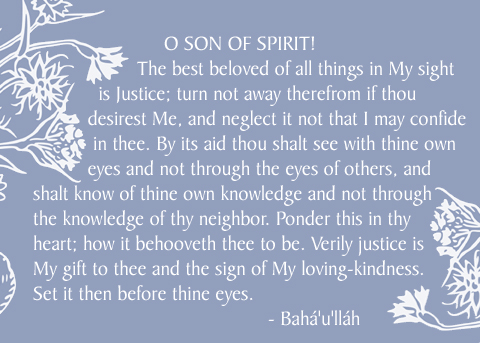|
 March
16, 2021
March
16, 2021
Healing Wounds
by Liliane Nkunzimana
 The one-year
anniversary marking the death of George Floyd is coming up. In many
ways the multitudes of people who expressed anger at this particular
death of a Black man were mourning the death of those who died before
him and at the injustice that racialized people continue to experience
today. The resounding response to address anti-Black racism has raised
hopes that this particular instance was perhaps a turning point.
For the events
of last summer to indeed be a turning point requires sustained effort
to both understand and act in good faith. Shoghi Effendi, Guardian of
the Bahá’í Faith and the great-grandson of the founder, Bahá’u’lláh,
wrote about the “grievous and slow-healing wounds” suffered by Blacks
in North America.
The one-year
anniversary marking the death of George Floyd is coming up. In many
ways the multitudes of people who expressed anger at this particular
death of a Black man were mourning the death of those who died before
him and at the injustice that racialized people continue to experience
today. The resounding response to address anti-Black racism has raised
hopes that this particular instance was perhaps a turning point.
For the events
of last summer to indeed be a turning point requires sustained effort
to both understand and act in good faith. Shoghi Effendi, Guardian of
the Bahá’í Faith and the great-grandson of the founder, Bahá’u’lláh,
wrote about the “grievous and slow-healing wounds” suffered by Blacks
in North America.
To think about the extent to which Black people as well other
racialized individuals today continue to be affected by the racial
prejudice that is deeply ingrained in systems throughout society, it
helps to understand the nature of these wounds not only for those who
suffer them, but also the harm done to those who cannot see or
recognize the harm.
If we are to build a just
society, do we not need the contributions of all its members? And if
our family members, neighbours or compatriots are weighed down by
systems that continuously put them at risk simply because of the colour
of their skin, do we not have a responsibility to stop and really seek
to understand the magnitude of these wounds?
The sincerity of our efforts to understand the injuries of racial
prejudice opens doors for conversations that perhaps we have not had
before. For these conversations to lead us towards healing, there needs
to be a willingness to trust and keep the door open for more
conversation, for friendships we have not had before and community
connections that are new and unfamiliar.
Shoghi Effendi spoke about the need for “genuine love, extreme
patience, true humility, consummate tact, sound initiative, mature
wisdom, and deliberate, persistent, and prayerful effort” to heal the
racial divide. As we look back to the events of last year, this is an
opportune time to think deeply about the nature of our interactions
with members of all races. In as much as the ideals of the Bahá’í Faith
transcend false notions of race, we all live in a world that has upheld
these notions and to a certain extent we may unknowingly have
internalised them.
Just as we are affected by the world around us, we also have ability to
influence conversations, uplift hearts and make fundamental changes in
our life that contribute to the creation of a more just society
especially through friendships and acts of service.
Shoghi Effendi writes, “We cannot segregate the human heart from the
environment outside us and say that once one of these is reformed
everything will be improved. Man is organic with the world. His inner
life moulds the environment and is itself deeply affected by it. The
one acts upon the other and every abiding change in the life of man is
the result of these mutual reactions.”
As we look to a new Bahá’í year, which at the end of the Bahá’í fasting
period begins on March 20, let us look to understand and rethink our
relationships with others. Let us seek remedies to these old, grievous
and slow-healing wounds. Above all else, let us seek to build true
friendships essential for the creation of a more just world.
|
|


